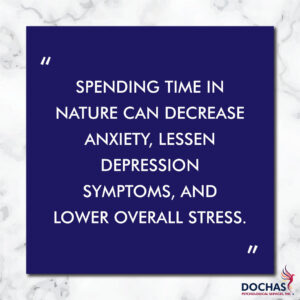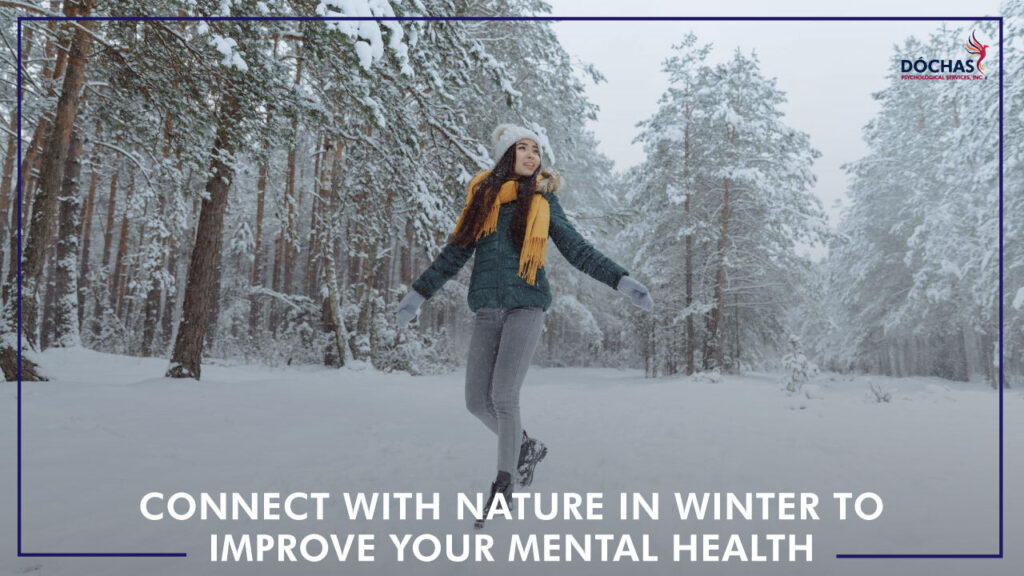When it’s the dead of winter and the days are dark and cold, you probably just want to huddle inside and stay warm. How can you give your winter mental health a boost? If you can convince yourself to break out the boots and bundle up, getting outside into nature can have huge, positive impacts on your mental health! Here’s how nature therapy works, and how you can take advantage of it even in winter.
What is Nature Therapy?
This might be the first time you heard the word “nature therapy.” It’s a relatively new field, and can also be called “nature-based therapy,” or “ecotherapy.” It’s based on a fundamental belief that our well-being as humans is intricately linked to that of our planet—we not only impact our environment, but our environment affects us as well.
The last eighteen months of pandemic pressure have been incredibly hard on mental health, but nature provides an avenue through which people could still connect without risking as much exposure to the virus. Green spaces like parks, campgrounds, recreational grounds, and mountain trails saw huge spikes in use as people who may not have been interested in outdoor activities sought out new opportunities and ways to cope.

How Does It Help? Who Is It Good For?
We are naturally more active when we spend time outside, be it in a local park, our backyard, or in the mountains. Not only are we more active, but being outdoors often means taking a break from our screens and having an opportunity to breathe deeply—creating a more mindful headspace.
Research also suggests that spending time in natural environments can be linked to numerous mental health benefits: being in green spaces has shown to decrease anxiety, lessen depression symptoms, and lower overall stress levels. In fact, research shows that spending just 120 minutes a week (less than 20 minutes a day) connecting with nature in the outdoors not only boosts our productivity and motivation, but also decreases depression symptom severity, strengthens relationships and self-reported feelings of connection, as well as increases concentration levels for both children and adults (especially those diagnosed with ADHD).
However, nature therapy isn’t just for individuals diagnosed with mental health disorders. Everyone can be positively impacted by reconnecting with the world around us.
What About Those of Us Who Live Places Where Winter Lasts Forever?
For those of us living in Alberta, winters are cold and can drag on for months. It can be super tough to focus on mental health, let alone feel motivated to get outside. It’s also the second winter during the COVID-19 pandemic. However, research shows that it is even more important to connect with nature through being outdoors or even indoors to protect and boost our physical and mental health.
I’ve compiled a list of my favourite winter activities for both individuals and families who want to connect with nature and I challenge you to try one or two this week.
Winter Outdoor Activities:
- Practice winter mindfulness using a simple feel your feet on the ground exercise: Step outside (with your shoes on) and take a moment to notice what your feet feel like on the ground. Can you feel the contact between the soles of your feet and your socks? What temperature are your feet? What does the ground feel like underfoot? Hard, soft, squidgy, wet? Take a moment to notice your feet wherever you are.
- Try identifying some trees and weeds: Just as knowing a person’s name helps you know them a little more, being able to name a plant changes your relationship to it. See how many you can name.
- Step outside and tune into your senses: Observing what you can feel, see, hear, smell, and taste is a key part of nature connection. If you are focused on these, other thoughts about life and the pandemic are pushed from the front of your mind. What movements do you see from the corners of your eye without moving your head? What do you smell? Where do you feel the wind touching your skin?
- Pick up litter: During the early days of the pandemic, green spaces saw a huge rise in trash left behind. Research shows that litter encourages more litter, so try taking a pair of gloves and bag on your next walk and picking up even a few pieces. It creates a cleaner environment, and can be a mindful/meditative practice.
- Reflect on how the seasons affect your body: Research shows our bodies often have different needs based on the season. We might get different illnesses, crave different foods, and have different movement, light, and sleep needs. Pay attention to your body’s signals and be curious about how the seasons are alive in you too. Think about how you can greet this without judgement.
- Create a sit spot: All you have to do is find a place to sit quietly outside and focus on tuning in with nature rather than tuning out.

Here are some more ideas to get you started:
- Build a snow fort/castle with sand toys
- Take a twenty-minute walk around the block
- Make a snow sculpture bird feeder
- Winter nature scavenger hunt
- Go on a “signs of spring” scavenger hunt
- Track animals in the snow or take pictures of tracks on a walk and use Google to identify once you get home.
- Try backyard snowshoeing
- Go icicle hunting
- Check out a local pond/rink for a bit of ice skating
- Bundle up warm and enjoy a winter picnic
- Sledding/tobogganing/tubing in the backyard or at a local hill
- Visit a local botanical garden or greenhouse
- Grow something indoors
- Check out skiing/snowboarding at a local hill
- Stargazing
- Backyard fire
- Winter camping
- Nature/snowflake artwork
- Create a winter family adventure journal
I hope this list makes you excited about connecting with nature and helps shake the feelings winter can bring. We all can take a moment to boost our winter mental health.
However, if you feel you’d benefit from a little more professional help as you navigate seasonal depression, or other “blue” feelings, you can book an appointment with one of our psychologists at Dochas: get in touch with us by calling us at 780 446 0300 or emailing info@dochaspsych.com.
About Dóchas Psychological
Dóchas Psychological Services is a well-established and trusted therapy clinic located in Spruce Grove, Alberta. At Dóchas we value the idea that everyone deserves a safe space. Through connection and education, our team works hard to build a trustworthy relationship with each of our clients. It is our goal to create a community for our clients to feel like they belong.
Disclaimer
Information provided through Dóchas Psychological Services blogs or vlogs is meant for educational purposes only. They are NOT medical or mental health advice. You can read more about our disclaimer here.

